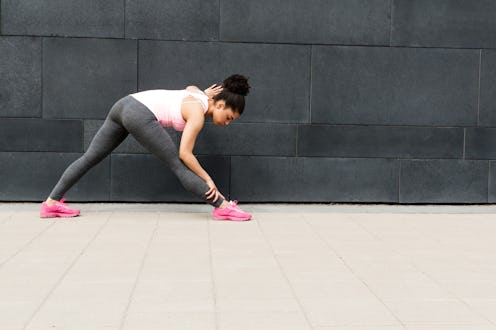Life
5 Surprising Ways Your Period Cycle Can Affect Your Workout

Working out is good for the body and for your mental health, but for people who get periods, their menstrual cycle can potentially throw a wrench into their cardio-yoga regimen. Hormonal fluctuations and their effects on the human body are still being understood, but it's now widely agreed among scientists that the phase of your period can affect your workout, from how you can most effectively train to how your body will recover.
"Scientific studies are exploring how fluctuations of hormones across the menstrual cycle can lead to different outcomes in training," Caroline Hardy, a senior designer at the period tracking app Clue, tells Bustle. And the conclusions are more complex than you might think.
The particular menstrual phase you're in in your cycle can help determine what kind of exercise is appropriate for your body; for instance, during your bleed itself, it's recommended by experts that high-intensity interval training, or HIIT, is your best bet for good results. But the information we have goes far beyond exercise type, into energy levels, injury risk and even how flexible you might be. Menstrual cycles affect many different parts of body function, including its temperature and metabolism, so it's not really surprising that your workout at the gym is going to alter depending on where your ovaries are at. Here are five unexpected ways your period can impact your workout.
1Your Muscles
"Some studies have found that strength training during the follicular phase," aka the week between the end of your period and when you begin to ovulate, "had a greater effect on muscle strength than during the luteal phase," aka the week before your period, Hardy explains. Muscles seem to get more gains during the follicular phase than the luteal phase in women doing weight training. Researchers aren't exactly sure why, but it may have something to do with estrogen, which peaks during the follicular phase and tapers off during the luteal one. "I never skip leg day before I ovulate," notes Hardy.
2Your Flexibility
Interestingly enough, ligaments in the female body seem to become looser and more elastic during the luteal phase. Estrogen might be the culprit again here. "Since hormones affect the elasticity of ligaments, it’s worth paying special attention to proper stretching and warm-up exercises during the luteal phase," says Hardy.
3Your Injuries
"A startling statistic for people playing sports is that women are 3 to 6 times more likely than men to have injuries to the anterior cruciate ligament," aka your ACL, Hardy tells Bustle. And that means you need to pay attention to the particular times when you're at risk. "A recent meta-review of studies looked at how hormonal changes may impact tendon laxity and risk of tendon injury," Hardy explains. "It found the risk was highest in the days leading up to ovulation, when estrogen is high." Just before you ovulate, you need to stretch and do extended warm-ups, particularly around your ACLs, to make sure that they're protected.
4Your Energy Levels
In the second part of your cycle, the levels of the hormone progesterone rises significantly. Your body temperature is also higher during this phase — it shoots up by at least 0.4 degrees Celsius after ovulation and stays high until menstruation. Your body is preparing for a potential pregnancy, should an egg have been fertilized at ovulation. As a result, you may find that you don’t have as much endurance during your luteal phase. You may not be able to hit max lifts and may feel worse in training compared to the first part of your cycle. So, don’t judge the results of your training based on your performance in this phase alone. Decreased performance is a perfectly normal experience in the luteal phase of your cycle.
5Your Recovery
"Body temperature tends to be slightly higher after ovulation, and resting heart rate may also fluctuate with the cycle. For athletes, these changes may affect how a workout, and recovery after a workout, feels. There is some evidence that endurance sports may feel slightly more difficult during the mid-luteal phase (between ovulation and menstruation)," explains Hardy. If you feel like things are harder just before your period and your body's taking longer to recover, you're not imagining things.
6
If you're a serious athlete or just like to be able to keep on top of your body's responses to training, it's worth considering tracking your period and exercise alongside one another. They might be more related than you think.